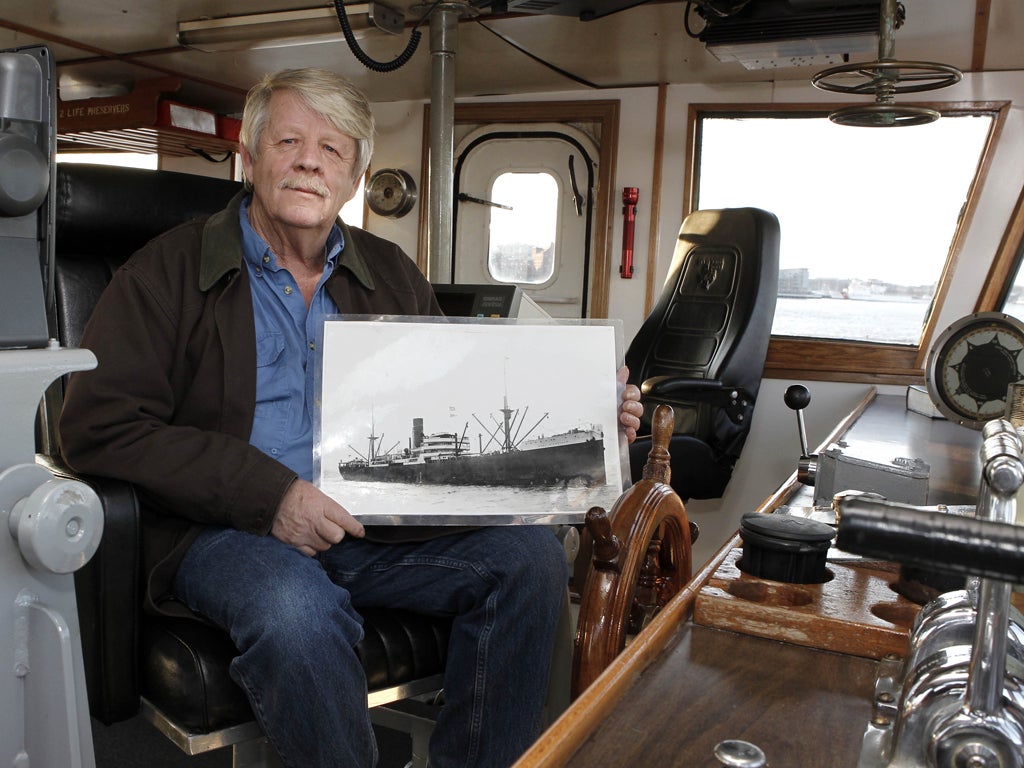Let battle commence: US diver hopes to find £2bn treasure on British war wreck
Possible hoard of platinum, diamonds and gold may be biggest ever – but who would keep it?

Your support helps us to tell the story
From reproductive rights to climate change to Big Tech, The Independent is on the ground when the story is developing. Whether it's investigating the financials of Elon Musk's pro-Trump PAC or producing our latest documentary, 'The A Word', which shines a light on the American women fighting for reproductive rights, we know how important it is to parse out the facts from the messaging.
At such a critical moment in US history, we need reporters on the ground. Your donation allows us to keep sending journalists to speak to both sides of the story.
The Independent is trusted by Americans across the entire political spectrum. And unlike many other quality news outlets, we choose not to lock Americans out of our reporting and analysis with paywalls. We believe quality journalism should be available to everyone, paid for by those who can afford it.
Your support makes all the difference.It is 70 years since the British merchant ship the SS Port Nicholson was sunk by a U-boat off Cape Cod during the Second World War.
According to the British Government, the cargo the steamer was carrying amounted to little more than machinery and military stores bound for allies in the United States.
But an American treasure hunter believes the official story masks a spectacularly more lucrative reality.
Veteran adventurer Greg Brooks, of Sub Sea Research, says he has found 30 cases containing platinum bars in the ship's hold worth up to $3bn (£1.9bn). "I'm going to get it, one way or another, even if I have to lift the ship out of the water," he said.
If substantiated, the hoard – also said to include gold bullion and diamonds – would be the richest haul of sunken treasure ever discovered. It also promises to lead to one of the most bitterly contested international maritime disputes in recent history.
Mr Brooks claims the ship was part of a convoy bringing Soviet payment for continued US support in the war against Hitler, then at its most critical point. He says a US Treasury Department ledger shows platinum bars were on board, valued in 1942 at about $53m.
Having discovered the ship in 2008,
on the ocean floor around 30 miles off Provincetown, Massachusetts, the Maine-based company has already obtained salvage rights from the US courts.
But some have expressed doubts the wreck holds platinum, and maritime law would complicate ownership claims.
Anthony Shusta, an attorney representing the British Government, says it is unclear if the ship ever carried platinum. He said: "We're still researching what was on the vessel. Our initial research indicated it was mostly machinery and military stores."
The United Kingdom will wait until salvage operations begin before deciding whether to file a claim on the cargo, he added.
Both British and US companies have previously examined the wreck, and are believed to have recovered some treasure, but Atlantic conditions make sustained work extremely challenging.
To further compound matters SSR is urgently in need of money to continue its search and is in talks with potential backers to upgrade equipment to make recovery a reality.
The company claims to have verified the identity of the vessel by its hull number using an underwater camera. Mr Brooks says he also has underwater video footage which shows a platinum bar surrounded by 30 boxes that he believes hold platinum ingots.
He has not yet brought up any platinum but says he and his crew hope to begin raising the treasure later this month. The treasure hunter said he held off the announcement of his find while he negotiated salvage rights.
The Port Nicholson was sailing from Halifax in Canada to New York when it was torpedoed and sank in 1942. Four people died when the ship went down and 87 were rescued.
Previous disputes have seen the treasure handed back to the nation of origin. The Royal Navy cruiser HMS Edinburgh, which was also carrying Soviet gold bullion when it was sunk in the Arctic in 1942, saw its contents salvaged in the 1980s with 90 per cent being split between the US, Britain and the Soviet Union.
Join our commenting forum
Join thought-provoking conversations, follow other Independent readers and see their replies
Comments